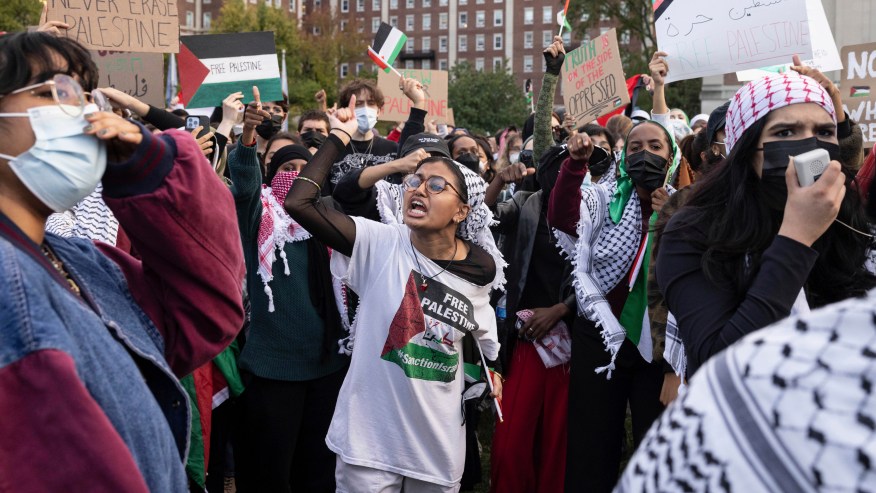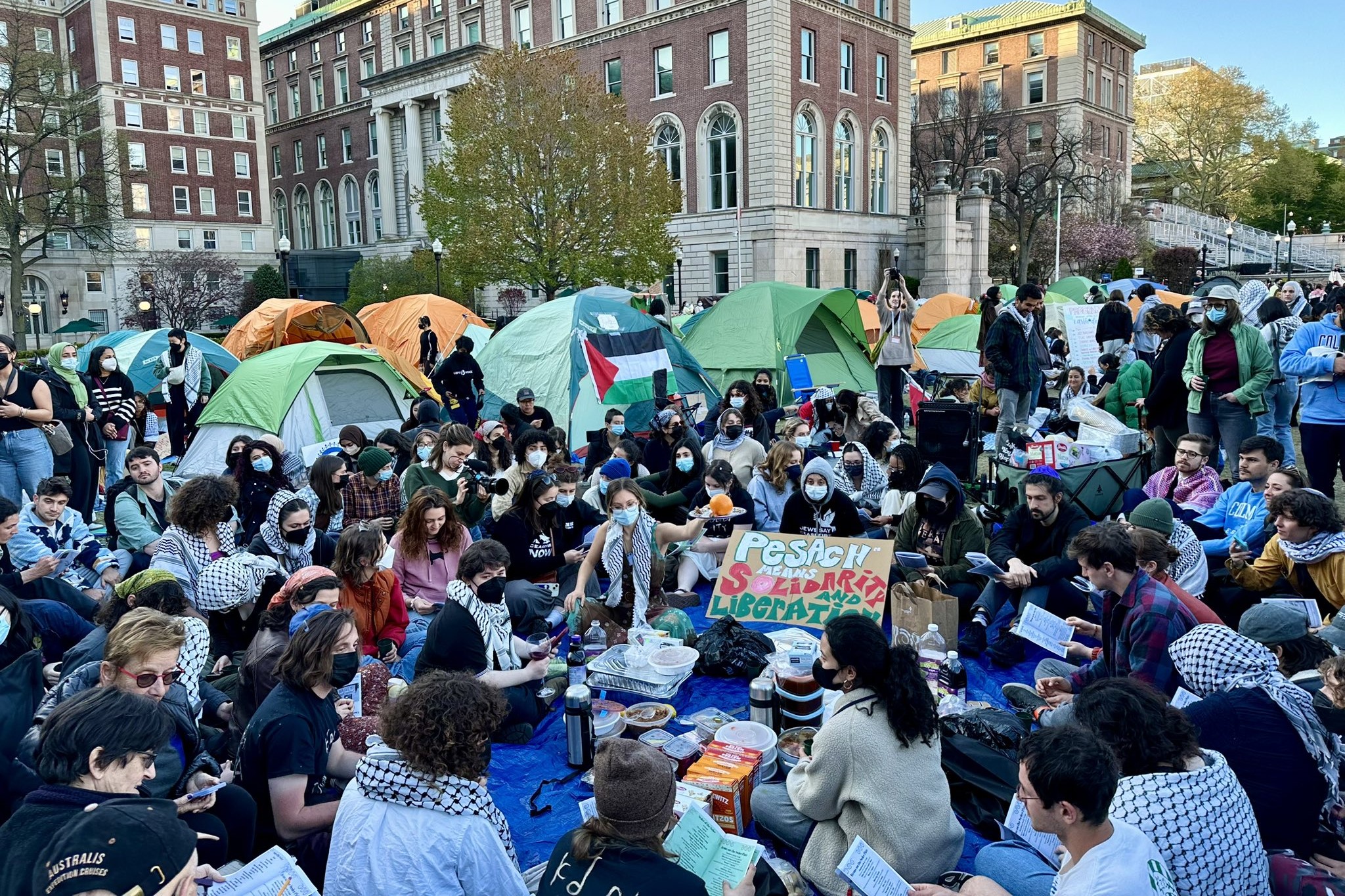Why Is Netanyahu Afraid of American Students' Calls to Divest from 'Israel'?

The students face a tough battle with the Zionist lobby.
Alongside the Israeli Occupation's frustration with American university students and professors protesting the massacre in Gaza, what troubles them more is the students' call to withdraw "investments" that their universities place in companies supporting or funding "Israel."
Students at most American universities have submitted petitions, displayed banners, and issued statements demanding the cessation of investments, either private or governmental, which contribute some of their returns to the Israeli Occupations government and its army, thus supporting the aggression on Gaza and its people.
These demands have unnerved Israeli Prime Minister Benjamin Netanyahu and his government, prompting them to attack the students and call on Washington to suppress them, not just for opposing their aggression on Gaza, but also for demanding to deprive "Israel" of the returns on these university investments.
Humanitarian Demands
American university students protesting on nearly 75 campuses currently are calling for a ceasefire in Gaza and an academic boycott of Israeli universities.
More importantly, they are urging their universities to withdraw all financial resources from the university, including endowment funds (investments), from companies and institutions benefiting from Israeli apartheid, genocide, and occupation in Palestine, according to a statement from Columbia University students.
They demand the withdrawal of their universities' direct investments or stakes in American companies conducting business in or with "Israel," including Amazon and Google, which signed a $1.2 billion contract with Netanyahu's government to provide advanced capabilities in artificial intelligence used in the genocide of Palestinians.
The protesting students also demanded the withdrawal of investments from Microsoft, which provides services to the Israeli Defense Ministry and Civil Administration.
Among the defense industries benefiting from the Gaza massacre is Lockheed Martin, whose profits increased by 14 percent, according to The Guardian on April 25, 2024.
The protests also targeted the university's investments in the online housing rental company Airbnb due to its services in the settlements in the West Bank.

The protesters also demand that their university sever ties with Caterpillar since 2003, when an armored bulldozer manufactured by the company ran over and killed American activist Rachel Corrie while she protested against the Israeli Occupation demolishing Palestinian homes.
Students at the University of California, Berkeley, and student groups at New York University have also called for divestment from "Israel" in all fields, according to The Guardian.
Other groups, such as the Alliance for Justice affiliated with Yale University and student groups at Cornell University, have pushed American officials to halt and cancel the university's investments in arms manufacturing companies specifically.
The American University Student Association issued a resolution on April 21, 2024, calling on Yale University to withdraw support from "Israel," but the university president, Sylvia Burwell, said that the university will not comply with their demands.
Protesting students at Princeton University demanded in a statement the withdrawal of its investments and the separation from "Israel," and the disclosure of university research funded by the U.S. Department of Defense related to weapons of war and their cessation.
This research includes automated software and artificial intelligence technologies used to enable genocide, according to the students.
Students at the University of Southern California outlined six demands, including disclosing and withdrawing investments in Israeli companies, ending study programs in "Israel," and severing academic and research ties with Israeli universities.
Though facing a tough battle with the Zionist lobby, supporters of divestment say their campaigns have raised awareness of the issues they shed light on.
They argue that the idea of divestment also aims to harm companies that mistreat protesters in various ways.
Among the demands of American university students is more transparency about university investments and cutting ties with Israeli academic institutions, including Columbia University's Global Center in Tel Aviv and its joint degree program with the same university.
The slogan "Divest from Israel" or from related companies was raised on protesters' banners, student newspaper headlines, and during public gatherings that swept through universities, amidst attempts to turn it into a comprehensive boycott movement against "Israel."
University Endowments
The concept of "endowment" or "university endowments" in America resembles the Islamic concept of "waqf," with the difference, according to historical experts, being borrowed from the history of Islamic endowment.
Wealthy Muslims, traders, and others would donate properties or money to spend on charitable matters including the sponsorship of education and the poor.
There are many stories about this Islamic endowment for education, such as donating lands to build a university or school, or allocating funds for charitable activities including education.
Following this Islamic model, most American universities rely on what is called "university endowments," which are investments or donations made to universities to spend on students. Universities invest these in American companies, some of which support the occupation of Palestine.
They rely on "endowments" earmarked for educational purposes, donated by individuals but placed in interest-bearing "investment funds," and the returns from these investments fund educational activities, which students object to when invested in companies funding Israel.

According to columnist Megan McArdle in The Washington Post, the value of these American university endowments, representing a massive accumulation of capital, is at least $839 billion according to the latest statistics.
She affirmed in an article published on April 25 that not all university funds are invested in stocks or corporate bonds. According to Columbia's annual trustee report, a quarter of the university's investments, about $3.7 billion, were in global stocks by the end of 2023.
There is another $3.6 billion in private equity, with the rest in cash, fixed income, and various alternative assets. This is a small amount compared to the global stock market, which is collectively valued at around $100 trillion.
Harvard University's endowment is the largest, reaching nearly $50 billion, as the largest American university, followed by Yale University with $27.2 billion, as the second-largest university endowment in the United States.
Harvard was founded in 1636 by the British philanthropist John Harvard, who contributed his wealth to its construction. These funds were invested until they reached over $50 billion today, according to the National Association of Independent Colleges and Universities on February 17, 2023.
Investments in Columbia University in New York are estimated to be nearly $14 billion, according to reports from 2023.
The New York Times reported on April 24, 2024, that these targeted funds subject to divestment demands, which protesters deem problematic, represent less than ten percent of Columbia University's $13.6 billion endowment, for example.
The newspaper adds that protesters are demanding greater transparency from the university about its private assets to better understand its total investments in "Israel."
Economic experts believe that one obstacle to withdrawing or amending investments is that those managing university endowment funds in the United States are external investment managers, such as investment banks or specialized investment funds, and their view of the matter is purely financial.
They also point to the complexity of these endowment funds for individual universities, making it difficult to determine which are associated with "Israel." Harvard University's largest-ever endowment, for example, is spread across 12,000 investment funds.
Almost a third of these are managed by a university-affiliated company, Harvard Management Company, with the remaining portion managed by specialized companies, according to American newspapers.
Complete Refusal
Several American universities have vehemently refused to withdraw or amend their investments that students say serve the Israeli Occupation and arms companies, contenting themselves with holding meetings to convince students of their importance and that not all investments support "Israel," according to the New York Times.
A report by CNN on April 26, 2024, stated that no universities have announced plans to withdraw investments related to "Israel," quoting "experts" who oppose accepting this demand.
Jonathan Massey, a professor at Yale Law School, told CNN the major obstacle to withdrawing investments is that any university that supports withdrawal sends a clear signal that it either submits to the demands of pro-Palestinian students or supports the destruction of "the state of Israel" and its citizens.
Harvard University, with a total endowment of nearly $50 billion, as the largest American university, stated that it opposes calls for boycotting "Israel" and its academic institutions.
George Dyer, executive director and co-founder of the target-specific endowment network, told the American Associated Press on April 26, 2024, that the issue of withdrawing or amending investments is not as easy as some believe.
He pointed out a material aspect that university endowment investment administrations seek away from the moral side, adding that this material aspect contributes to gaining the support of endowment managers and boards of directors directly managing university investments.
American policymakers and businessmen see one reason for the reluctance of university endowment administrations to take steps to sever investment ties with "Israel" as the division within the campus between those who oppose the Gaza genocide and those who support "Israel."
The Joe Biden administration and members of Congress describe those protests supporting an end to aggression and condemning "Israel" as "anti-Jewish and anti-Semitic," which is the general trend in American media.
Politically, it will be difficult to translate the minimal impact of withdrawing investments on companies into a change in the policies of countries where these companies are headquartered.
Yale University announced in a statement on April 21, 2024, that it will not withdraw its investments from military arms manufacturing companies, claiming that its investment advisory committee does not consider this activity to meet divestment criteria.
It stated that military manufacturing supports socially necessary uses, such as law enforcement and national security.
Among the other universities that have refused to withdraw their investments from "Israel" during the recent wave of protests is the University of Michigan, whose board of trustees said it would not consider withdrawing investments "of any kind."
Calls to withdraw investments from "Israel" are not new and are not directly related to the Gaza aggression since October 7, 2023. They were raised by students at American universities in recent years as part of the Boycott, Divestment, and Sanctions movement (BDS).
A student committee at Brown University recommended in 2020 that the university withdraw its investments from some companies that "profit from human rights violations in Palestine," but university president Christina Paxson rejected the proposal, as reported by The New York Times.
In 2009, Hampshire College withdrew its investments from a mutual fund that owned Israeli shares after facing pressure from activists in this movement, although the institution's administration officially denied that the decision was due to boycott calls.
More Like Scabies
The Israeli Occupation was particularly disturbed that this boycott campaign began to bear fruit. The University of York in Britain decided to end its financial relationships with arms manufacturing companies supplying ammunition to the Israeli army.
Portland University preempted protests in support of divestment from the campus and decided in a letter sent to faculty and students to stop accepting any donations from Boeing because it participates in the Israeli war machine.
This success of the boycott campaign came after the number of universities protesting for Palestine and demanding the cessation of any American investments in "Israel" or their universities entering into investments with companies supporting "Israel" reached nearly 75 universities.
This prompted writers at Haaretz to write a notable article on April 25, 2024, stating that "Israel" has become like scabies that everyone is fleeing because of Gaza.
"In many places we are simply persona non grata, almost Satan," they said.
"Israeli filmmakers, publishers, producers, artists, curators, and musicians all have the same message: We and our creative work are unwanted internationally."
What worries "Israel" even more is the focus of American university students on divesting from arms companies and BlackRock funds, the largest asset management company globally, which owns shares in all publicly traded companies.









